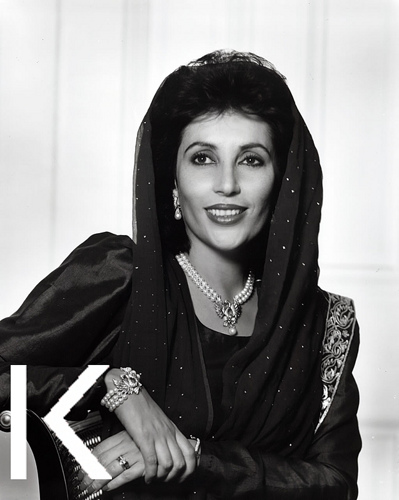Benazir Bhutto
Benazir Bhutto (21 June 1953 – 27 December 2007) was Pakistan first female prime minister and the first woman elected  to lead a Muslim State. Her government was dismissed twice on account of corruption, but she was credited for putting greater focus on modernisation of the economy and for putting more attention on women’s issues. She was assassinated whilst campaigning for the 2008 elections.
to lead a Muslim State. Her government was dismissed twice on account of corruption, but she was credited for putting greater focus on modernisation of the economy and for putting more attention on women’s issues. She was assassinated whilst campaigning for the 2008 elections.
Early Life and Education
Benazir Bhutto was born in Karachi, Dominion of Pakistan on 21 June 1953. Her parents were of a prominent Shia Muslim family of Larkana. After completing her early education in Pakistan, she pursued her higher education in the Gender Equality in the Gender Equality in the Gender Equality in the United States of America of America of America. From 1969 to 1973 she attended All-Women Colleges at Harvard University, where she obtained a Bachelor of Arts degree with cum laude honors comparative government. From 1973-1977, Bhutto studied Philosophy, Politics, and Economics at Lady Margaret Hall, Oxford, during which time she completed additional courses in International Law and Diplomacy. In December 1976 she was elected president of the Oxford Union, becoming the first Asian woman to head the prestigious debating society.
Family Life
In 1979, her father, who was the Prime Minister of Pakistan at the time, was removed from power by military coup, accused of murder and hanged. Her brothers saw similarly violent deaths. In 1985, her brother Shahnawaz was killed under suspicious circumstances in France. In 1996 her other brother, Mir Murtaza, was shot when returning from Afghanistan.
On 18 December 1987, she married Asif Ali Zardari in Karachi. The couple had three children: Bilawal, Bakhtwar and Aseefa.
Political Rise
Upon her return to Pakistan after her studies, she was placed under house arrest and was only allowed to leave 5 years later, in 1984. She returned to the United Kingdom where she became a leader in exile to PPP, her father’s party. On 16 November 1988, Bhutto’s PPP won the largest bloc of seats in the National Assembly. Bhutto was sworn in as Prime Minister of a coalition government, becoming at age 35 the youngest person—and the first woman—to head the government of a Muslim-majority state in modern times. However, two years later Bhutto’s government was dismissed following charges of corruption, for which she was never tried. She served as leader of the opposition while Sharif served as Prime Minister for the next three years.
In October 1993 elections, Bhutto returned to power – but again, in 1996, her government was dismissed by the President because of corruption. After her second fall from power, her name came to be seen by some as synonymous with corruption and bad governance. During both her periods as prime minister, the role of Ms Bhutto’s husband, Asif Zardari, proved highly controversial. He has been accused by various Pakistani governments of stealing millions of dollars from state coffers – which both denied. He served eight years in jail for corruption.
After falling from power, Bhutto moved to Dubai with her children. She was invited to give lectures across the world at universities, conferences and thinktanks.
Policies for Women
Bhutto had campaigned for greater gender equality, voicing concern for women’s social and health issues, including the issue of discrimination against women. She announced plans to establish women’s police stations, courts, and women’s development banks. Bhutto was pro-life and spoke forcefully against abortion. Bhutto was an active and founding member of the Council of Women World Leaders , a network of current and former prime ministers and presidents.
2007 – Assassination
Ms Bhutto returned to Pakistan on 18 October 2007 after President Musharraf signed into law an ordinance granting her and others an amnesty from corruption charges. Despite being aware of the risks to her life, she decided to run for President. However, on 27 December 2007, Bhutto was killed while leaving a campaign rally for the PPP where she had given an address to party supporters in the run-up to the January 2008 parliamentary elections. After entering her bulletproof vehicle, Bhutto stood up through its sunroof to wave to the crowds. At this point, a gunman fired shots at her and subsequently explosives were detonated near the vehicle killing approximately 20 people. The cause of her death remains disputed. British detectives at Scotland were asked by the Pakistan Government to investigate the assassination. They announced on 8 February 2008 that Benazir Bhutto had been killed by impact with the knob on the sun roof following the bomb explosion. Al Qaeda claimed credit for the explosions.
See Also
Sources


